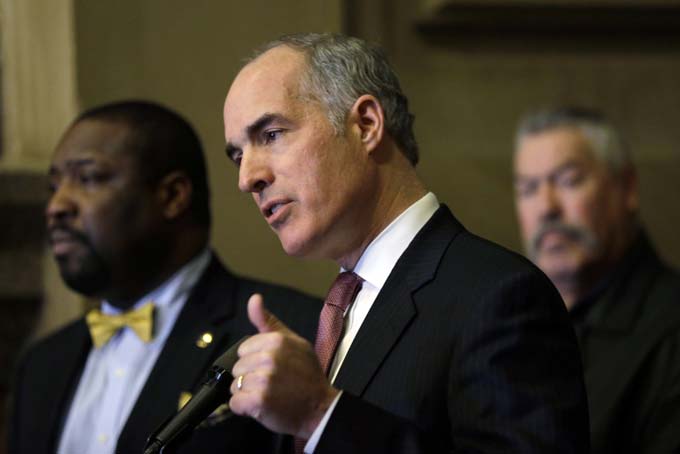
PHILADELPHIA (AP) – An oil train derailment in Philadelphia last year had the potential for disaster. Seven cars left the tracks on a bridge near a busy university and residential corridor and two of them dangled precariously over the Schuylkill River.
Pennsylvania’s largest city has a 228-member hazardous materials unit that regularly trains for such incidents, but in communities with less manpower and fewer resources, the response to an oil train derailment vary greatly.
U.S. Sen. Bob Casey Jr. said Monday he wants to change that, with a bill that would streamline training and establish a Federal Emergency Management Agency subcommittee to craft recommendations and assess funding.
“What we can’t do is wait for the day something terrible happens to act,” the Pennsylvania Democrat said at a news conference at Philadelphia’s City Hall.
U.S. Sen. Heidi Heitkamp, D-N.D., introduced the RESPONSE Act this month after several derailments, leaks and explosions involving trains transporting highly volatile oil from her state’s Bakken Shale.
The bill would provide training for firefighters in their home communities and at a federal facility in Pueblo, Colorado, connect small departments to experts in combating hazardous materials leaks and fires, and create a national database to track train incidents.
Up to 80 oil trains roll through Philadelphia each week, Casey said.
Four oil trains have derailed in Pennsylvania in the last 15 months – the January 2014 incident on the bridge and another in Philadelphia and two near Pittsburgh – and last month a massive explosion rocked neighboring West Virginia.
No oil spilled and no one was hurt in the bridge derailment, but it worried activists and local leaders, including City Councilman Kenyatta Johnson, because of its proximity to a major waterway and a densely populated neighborhood.
“I thank God there was not a catastrophe,” Johnson said Monday. “Not only an environmental catastrophe, but a catastrophe where there was a loss of life.”